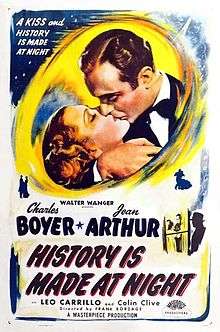History Is Made at Night (1937 film)
| History is Made at Night | |
|---|---|
 Film poster | |
| Directed by | Frank Borzage |
| Produced by | Walter Wanger |
| Written by | C. Graham Baker |
| Screenplay by |
Gene Towne Vincent Lawrence David Hertz |
| Starring |
Charles Boyer Colin Clive Jean Arthur David Hertz Frank Borzage |
| Music by | Alfred Newman |
| Cinematography |
David Abel Gregg Toland |
| Edited by | Margaret Clancey |
| Distributed by | United Artists |
Release dates |
|
Running time | 95 min |
| Country | United States |
| Language | English |
| Budget | $821,791[1] |
| Box office | $948,500[1] |
History Is Made at Night is a 1937 romantic drama with elements of comedy and spectacle.
It deals with a love triangle among a possessive shipping magnate, his beautiful wife, and a French headwaiter, with a spectacular ocean liner as a backdrop.
Colin Clive plays the insanely jealous and homicidal husband, Bruce Vail. Jean Arthur is his wife, Irene, and Charles Boyer is Paul, the headwaiter with whom she falls in love.
The film was produced by Walter Wanger and directed by Frank Borzage. Leo Carrillo portrays Paul's best friend, Cesare. The film has an amazing Titanic-like climax, when the ocean liner "SS Princess Irene" (named after Jean Arthur's character) strikes an iceberg on its maiden voyage. The Hindenburg is mentioned in dialogue, but not shown. The Vails are set to travel via the airship to Paris to testify in a court trial before changing plans. The Hindenburg disaster happened two months after the release of the film.
Plot
Irene Vail (Jean Arthur) decides to divorce her husband, the rich ship owner Bruce Vail (Colin Clive), after he falsely accuses her of having an affair. Bitterly jealous and possessive of Irene, Vail learns that he can prevent the divorce from being finalized if he can provide evidence that she has been involved with another man within six months of filing for divorce. Vail pays his driver, Michael (Ivan Lebedeff), to go to Irene's hotel room in Paris and pretend to be her lover, with the intention of having a private detective catch them in a compromising position. However, an unknown man overhears Irene's startled cry upon finding Michael in her room. A struggle ensues when the man defends Irene against Michael's unwanted advances, and ends with Michael on the floor, unconscious. When Vail and the detective burst into the room, the man threatens them with a gun, demands Irene's jewelry, and takes Irene hostage.
Once they are away, the intruder, Paul Dumond (Charles Boyer), returns Irene's jewelry and invites her to dine with him at the Château Bleu restaurant, where he works as a waiter. They dance the night away and Irene falls madly in love with the charming and handsome Paul. In the morning, Irene returns to find Vail and the police in her room, for Michael is dead. Vail leads her to believe that Paul is responsible for his death, and blackmails her into coming back to America with him in exchange for Paul's freedom. Distraught that he is unable to find Irene, Paul reads in the newspaper that Irene has reunited with her husband and left for America. Sensing something is wrong, he embarks for the United States to find her, accompanied by Cesare (Leo Carrillo), his good friend and head chef of Château Bleu.
In Manhattan, Paul and Cesare rehabilitate a restaurant, with the hope that its reputation will cause Irene to come to dine. The reunion takes place at last, but the happiness is short-lived when Paul learns that Michael is dead and a man has been arrested in Paris for the murder. Unwilling to let an innocent man pay for what he thinks is his crime, Paul embarks for Paris, and Irene joins him. They travel on the liner Princess Irene, which is owned by Vail.
Vail learns they are on the ship. In a rage, he radios orders to the captain to run at full speed, despite the danger of collision with an iceberg in the poor weather conditions, supposedly to break the record for fastest crossing. He actually hopes the ship will be sunk, killing Paul and Irene. The ship does strike an iceberg, and premature news reports state that the ship has sunk with horrendous loss of life. Consumed by guilt, Vail commits suicide and confesses to killing Michael in a suicide note. But the Princess Irene's bulkhead doors manage to hold the water and prevent the ship from sinking. There is no loss of life, and Paul and Irene and the other passengers rejoice when they hear the news. They also learn that other ships are coming to their aid to help the crippled liner.
Cast
- Charles Boyer as Paul Dumond
- Jean Arthur as Irene Vail
- Leo Carrillo as Cesare
- Colin Clive as Bruce Vail
- Ivan Lebedeff as Vail's Chauffeur
- George Meeker as Mr. Norton
- Lucien Prival as Private Detective
- George Davis as Maestro
- Byron Foulger as Vail Employee Reading from Newspaper
- Tom Ricketts as Old Man Getting in Lifeboat
- Señor Wences as 'Coco' Hand Trick Performer
Reception
The film made a profit of $17,450.[1]
The film is recognized by American Film Institute in these lists:
- 2002: AFI's 100 Years...100 Passions – Nominated[2]
References
- 1 2 3 Matthew Bernstein, Walter Wagner: Hollywood Independent, Minnesota Press, 2000 p437
- ↑ "AFI's 100 Years...100 Passions Nominees" (PDF). Retrieved 2016-08-19.
External links
- History Is Made at Night at the Internet Movie Database
- History Is Made at Night at AllMovie
- History Is Made at Night at the TCM Movie Database
- Slant Magazine review
- Dave Kehr at Chicago Reader